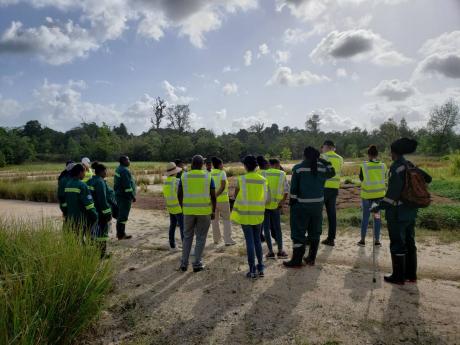Earth Today | IWEco: Putting people at the centre
THE INTEGRATING Water, Land and Ecosystem Management in Caribbean Small Island Developing States (IWEco) project is putting the region’s people at the centre of its activities as it moves to preserve Caribbean ecosystems and sustain livelihoods.
Interventions under the project have included improved fresh and coastal water resources management, sustainable land and forest management – with enhancing resilience of socio-ecological systems to the impacts of climate change a key element.
An integral part of the project is executed through the GEF Small Grants Programme (GEF SGP), with their involvement coordinated by the United Nations Development Programme (UNDP).
“GEF IWEco allocated US$1 million in funding to UNDP GEF SGP to enable activities in alignment with the respective IWEco national sub-projects, which build capacity for enterprise development and implementation amongst local community groups in support of its overall objectives. This funding is matched by GEF SGP, which also provides technical support,” notes a recent article on the subject from project principals.
“SGP’s considerable experience in building economic livelihoods through community-based initiatives supports one of IWEco’s key objectives, that of enhancing livelihood opportunities and socio-economic co-benefits for targeted communities from improved ecosystem services functioning,” it added.
“Essentially, SGP provides direct financial and technical support to communities and local organisations in participating countries to address the project objectives at the community level. Co-financing is also generated at the community level to leverage additional support,” the article said further.
A demonstration of the project’s people focus is seen, for example, in Cuba’s San Juan River Basin, where 60 farmers have been trained to assemble and operate biodigesters for pig waste. These have so far been installed and are in operation at 51 farms, with the expected result being a significant reduction of waste discharge to the San Juan River,as well as reduced emissions of methane gas and nitrous oxide. The methane produced in the biodigesters will be used for cooking and lighting, thereby reducing the use of firewood and improving family health.
In the Yerba Buena and Mata Palacio municipalities in the Dominican Republic, 65 hectares of forest have been restored and protected in the Higuamo Watershed. Some 25 beekeepers have been trained and 10 apiaries have started to produce as much as 5,000 gallons of honey per year.
GOOD USE OF FUNDING
Higher up in the same watershed, 50,000 trees that support apiculture have been planted, 1,500 hectares of tropical forest are being protected, and 32 beekeepers have been trained, with 15 apiaries in production.
“This is a good example of how funds provided by IWEco have been blended with other SGP grant funding and co-financing to enable complementary interventions across a larger area, thereby having greater impact,” the article said.
In St Kitts & Nevis, the Gideon Force Agricultural Co-operative Society Ltd, located in Verchild’s Mountain, St Kitts, was able to address water shortages and associated food insecurity, both major issues locally. The co-op produces and markets organic produce, but there has not been enough water available to adequately irrigate their crops in the past.
They constructed a water-harvesting system to supply an organic farm, which helped them to grow more and improve their livelihood. They received training in agriculture and water conservation practices, and even installed a solar-operated pump to transport water from the catchment to their plots.
In Trinidad & Tobago, members of nearby communities were trained by two non-governmental organisations, the Trust for Sustainable Livelihoods and IAMovement, in land rehabilitation and sustainable planting techniques at three former quarry sites on the compound of the National Quarries Company Ltd. These ‘quarry rehabilitation champions’ have gone on to apply these techniques to fruit and vegetable production, as well as learned how to use vetiver grass to make a variety of products, thereby creating alternative livelihood opportunities.
“The project will continue to assist in the development and strengthening of community-based initiatives and livelihoods, paying attention also to vulnerable groups and the youth,” stressed Jan Betlem, regional project coordinator.
“If elements such as ecosystem stewardship, nature-based business strengthening, climate proofing and knowledge sharing in and around GEF IWEco project sites can be more incorporated into enterprise development at the community level, this will, in a harmonious way, contribute to the fulfilment of the main project outcomes as well as to the Caribbean environment at large,” he added.

